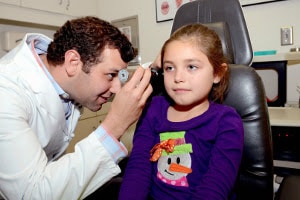Unilateral hearing loss (UHL) means that your child has loss of hearing in one ear, which can range from mild to profound. Although children with unilateral hearing loss can still manage well at home or in educational and social settings, parents must be armed with the right information to make the best decisions and help their children thrive.
Below, we cover what you need to know about the signs and causes of sudden hearing loss in one ear and what you should do about it.
Why Does Your Child Say They Can’t Hear Out of One Ear?
If your child says they have trouble hearing, or if they’re fussy, feverish, and complaining that things sound funny or clogged, they might be having symptoms of temporary hearing loss in one ear.
The potential reasons why they temporarily can’t hear out of one ear include:
- Middle ear infection: Acute otitis media (AOM) is the most common type of ear infection. It occurs when parts of the middle ear become infected and swollen, leading to fluid accumulation behind the eardrum.
- Swimmer’s ear: This refers to a bacterial infection caused by water build-up in the outer ear canal that leads to bacterial growth.
- Impacted earwax: Earwax protects the ear by stopping dirt and other particles from entering and irritating the eardrum. When there is too much earwax, it gets impacted, causing symptoms such as temporary hearing loss.
- Other obstructions: Since children have a habit of sticking objects into body orifices such as the ear, foreign objects like beans, pebbles, and candies can get stuck in the ear canal.
The following conditions and events can cause permanent hearing loss:
- Hereditary conditions
- Genetic disorders
- Exposure of the baby to diseases such as rubella (German measles)
- Loud noises (firecrackers, loud stereos, and concerts)
- Injuries
- Meningitis and mumps
What Is the Most Common Cause of Hearing Loss in One Ear in Children?
Children with one-sided hearing loss may have sensorineural deafness, a type of hearing loss caused by damage in the inner ear (cochlea), or conductive deafness, which is caused by microtia and/or atresia. Microtia is a condition where the ear does not fully develop during the pregnancy’s first trimester, while atresia is the absence or underdevelopment of the ear canal and middle ear structures.
Can Hearing Loss in One Ear Be Serious?
Sudden loss of hearing in one ear can be mild or severe, or an underlying condition may cause it. Regardless, sudden hearing loss always requires immediate medical attention.
Hearing loss can cause communication and comprehension problems or increase the risk of cognitive decline and balance issues. The risks increase as your child gets older. The earlier you get a diagnosis, the sooner you can determine the best approach to treating and managing the condition.
Is One-Sided Hearing Loss Temporary?
Some people with one-sided or partial loss of hearing in one ear regain a part or all of their hearing with treatment. For the majority, however, hearing loss is permanent.
What Is the Best Way to Help a Child With Unilateral Hearing Loss?
No single intervention or treatment is the right solution for every child or family dealing with unilateral hearing loss. An effective plan should include close monitoring, regular follow-ups, and accommodating changes along the way. To help your child, consider the following options:
- Take advantage of technology: Different devices can help a child make the most of their residual hearing. Examples include:
- Hearing aids: Worn behind the ear, these devices amplify sounds. A hearing aid can help your child learn speech skills better.
- Cochlear implants: Rather than amplify sound, these electronic devices provide the sense of sound by directly stimulating the auditory nerve.
- Bone-anchored hearing aids: These surgically implanted devices amplify sound via bone vibration to the cochlea.
- Join support groups: Support is anything that can help a family and may include seeking advice and information from other parents who have children with UHL, working with a deaf mentor, or joining online support groups.
- Take advantage of other resources: Various agencies and organizations provide information as a central resource for families with children who are deaf or have UHL. Examples are:
- Contact a pediatric ENT specialist: Seeking medical attention from an expert is the best way to help your child. A pediatric ENT is a specialist trained to diagnose and treat hearing loss and speech delay in children. An ENT will go through your child’s medical history, perform a hearing screening, and diagnose any potential hearing loss. Since ENTs are ear specialists, they can also recommend the best treatment options for your child.
At Pediatric ENT Associates at Children’s of Alabama, our team of highly trained, board-certified surgeons are Alabama-licensed experts focusing on ear, nose, and throat diseases in infants and toddlers. They specialize in the diagnostic and surgical care of head and neck diseases, including different types of hearing loss.
Our physicians can accurately diagnose your child’s condition and create a personalized treatment plan. They are active members in interdepartmental programs at Children’s of Alabama and can provide a comprehensive approach to your child’s care.
Contact us today to schedule a consultation and learn more about the best treatment for your child’s hearing loss.


